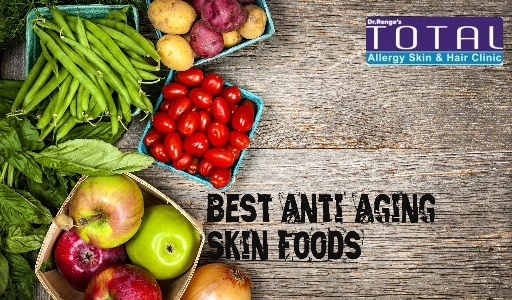Anti Aging Skin Foods

From your brain to your bones, what you eat matters. So help yourself to some age-defying foods.
“What you eat makes a huge difference in how you age and how you feel,” dietitian says.
“Even your skin will stay younger-looking if you eat right,” says, an expert in anti-aging and regenerative medicine
What to Put on Your Plate:
Colorful fruits and vegetables. The antioxidants in colorful vegetables and fruits, such as leafy greens, deep red tomatoes,grapes, and carrots, help stop unstable molecules from damaging healthy cells. So at each meal, fill about half your plate with fruits and vegetables.
Three particular antioxidants — vitamin C, zinc, and beta-carotene — help protect your vision from macular degeneration, the leading cause of blindness after age 64. If you already have macular degeneration, eating foods with these nutrients may slow its progress.
Dark green, leafy vegetables — spinach, kale, collard, and mustard greens — are great sources. But you also help your eyes when you eat bright-colored produce, including corn, peppers, oranges, and cantaloupe.
A powerful antioxidant in grapes and red wine, called resveratrol, may help lower your odds of getting cancer, heart disease, and premature aging.
Antioxidants like vitamin C can even help keep your skin younger-looking. One study linked eating lots of yellow and green vegetables to fewer wrinkles.
Whole grains. Eating whole grains rich in fiber — oats, quinoa, barley, wheat, and brown rice — lowers your chance of developing type 2 diabetes. A healthy diet that contains whole grains also keeps blood vessels in peak condition. Your goal is three servings of whole grains a day.
Fish. Omega-3 fatty acids in fatty fish offer many anti-aging benefits. They help protect your heart, lower your odds of having a stroke, and may even help guard against Alzheimer’s disease. Help yourself to two servings a week of fatty fish such as salmon, lake trout, or tuna. If you typically get tuna from a can, choose albacore packed in water for the most omega-3s. If you don’t eat fish, ask your doctor if you should take fish oil supplements.
Dairy. The calcium and fortified vitamin D in dairy foods are crucial to strong bones. They help prevent osteoporosis, for instance. Include 3 cups of low-fat milk, yogurt, or other dairy products a day. By choosing low-fat instead of regular dairy, you’ll help keep your cholesterol levels in check, making you less likely to get heart disease. If you don’t eat dairy, look for other foods (like soy milk, almond milk, or cereals) that are fortified with calcium and vitamin D.
Nuts. The fats in nuts are among the healthiest you can find. If you avoid nuts because they’re high in fat, think again. In fact, one study showed that snacking on nuts cut the risk of high blood pressure and high cholesterol by about 20%. You only need to eat 1/4 of an ounce a day to get the benefits — that’s about 4 almonds.
Beans and lentils. These foods give you loads of fiber and plant-based protein, so they’re an age-protecting alternative to red meat with saturated fat, which is linked to heart disease and diabetes. Beans and lentils are inexpensive and easy to add to soups, casseroles, and side dishes.
Foods to Avoid
For the best anti-aging diet, it’s important to limit foods that can harm your body. It’s easy if you follow these three guidelines.
Go easy on high-fat meat, high-fat dairy, and bakery treats. The saturated fat found in these foods can clog your arteries, which can lead to heart problems.
Limit added sugar as much as possible. Eating too much sugar can send your blood sugar levels on a roller-coaster ride of ups and downs. Over time, excess calories may cause insulin resistance, which can lead to type 2 diabetes. Diabetes damages your blood vessels and often leads to heart disease. “The less sugar you eat, the healthier you’ll be,” experts says.
Spare the salt. Eating too much salt, or sodium, can raise your blood pressure. Over time, high blood pressure can damage many parts of your body, including your kidneys, your eyes, and your brain. Limit sodium to 2,400 milligrams — about 1 teaspoon of table salt — throughout your entire day. If you have high blood pressure, are 51 or older, or have diabetes or chronic kidney disease, you should eat even less, no more than about 1,500 mg a day. Check labels for the sodium content in canned, frozen, and boxed foods. Packaged foods typically pack in a lot of salt — you may be eating more than you realize.